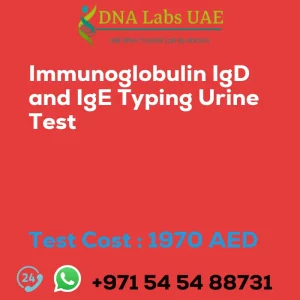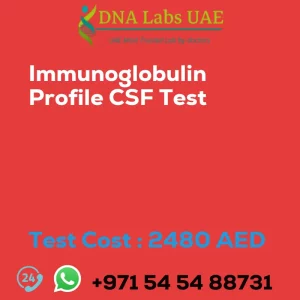ANCA ANTINEUTROPHIL CYTOPLASMIC ANTIBODIES IFA IN DILUTIONS Test
Test Cost: AED 820.0
Symptoms Diagnosis:
The ANCA ANTINEUTROPHIL CYTOPLASMIC ANTIBODIES IFA IN DILUTIONS Test is a laboratory test used to detect the presence of specific antibodies in the blood called antineutrophil cytoplasmic antibodies. These antibodies are associated with autoimmune diseases such as vasculitis, which is inflammation of the blood vessels.
Test Components:
- Price: AED 820.0
Sample Condition:
- 2 mL (1 mL min.) serum from 1 SST
- Ship refrigerated or frozen
- Overnight fasting is preferred
Report Delivery:
- Sample Daily by 11 am
- Report Next day
Method:
Immunofluorescence Assay
Test Type:
Autoimmune Disorders
Doctor:
- Nephrologist
- Physician
- Neurologist
Test Department:
Immunopathology
Pre Test Information:
Overnight fasting is preferred
Test Details:
The ANCA (Antineutrophil Cytoplasmic Antibodies) IFA in Dilutions Test is a laboratory test used to detect the presence of specific antibodies in the blood called antineutrophil cytoplasmic antibodies. These antibodies are associated with autoimmune diseases such as vasculitis, which is inflammation of the blood vessels.
The test involves diluting the patient’s blood sample and incubating it with neutrophils, which are a type of white blood cell. The diluted blood sample is then examined under a microscope to see if any antibodies are binding to the neutrophils. If the antibodies are present, they will appear as fluorescent patterns around the neutrophils.
The test is typically performed using different dilutions of the blood sample to determine the titer of the antibodies. The titer refers to the highest dilution at which the antibodies can still be detected. A higher titer indicates a higher concentration of antibodies in the blood.
The ANCA IFA in Dilutions Test is useful in diagnosing and monitoring autoimmune diseases such as granulomatosis with polyangiitis (formerly known as Wegener’s granulomatosis), microscopic polyangiitis, and eosinophilic granulomatosis with polyangiitis (formerly known as Churg-Strauss syndrome). It helps in distinguishing between different types of vasculitis and can guide treatment decisions.
It is important to note that this test is just one component of the diagnostic process for autoimmune diseases and should be interpreted in conjunction with the patient’s clinical symptoms, medical history, and other laboratory tests. A positive ANCA test does not necessarily mean a person has an autoimmune disease, and further evaluation is often required to confirm the diagnosis.
| Test Name | ANCA ANTINEUTROPHIL CYTOPLASMIC ANTIBODIES IFA IN DILUTIONS Test |
|---|---|
| Components | |
| Price | 820.0 AED |
| Sample Condition | 2 mL (1 mL min.) serum from 1 SST. Ship refrigerated or frozen. Overnight fasting is preferred. |
| Report Delivery | Sample Daily by 11 am; Report Next day |
| Method | Immunofluorescence Assay |
| Test type | Autoimmune disorders |
| Doctor | Nephrologist, Physician, Neurologist |
| Test Department: | IMMUNOPATHOLOGY |
| Pre Test Information | Overnight fasting is preferred. |
| Test Details |
ANCA (Antineutrophil Cytoplasmic Antibodies) IFA in Dilutions Test is a laboratory test used to detect the presence of specific antibodies in the blood called antineutrophil cytoplasmic antibodies. These antibodies are associated with autoimmune diseases such as vasculitis, which is inflammation of the blood vessels. The test involves diluting the patient’s blood sample and incubating it with neutrophils, which are a type of white blood cell. The diluted blood sample is then examined under a microscope to see if any antibodies are binding to the neutrophils. If the antibodies are present, they will appear as fluorescent patterns around the neutrophils. The test is typically performed using different dilutions of the blood sample to determine the titer of the antibodies. The titer refers to the highest dilution at which the antibodies can still be detected. A higher titer indicates a higher concentration of antibodies in the blood. The ANCA IFA in Dilutions Test is useful in diagnosing and monitoring autoimmune diseases such as granulomatosis with polyangiitis (formerly known as Wegener’s granulomatosis), microscopic polyangiitis, and eosinophilic granulomatosis with polyangiitis (formerly known as Churg-Strauss syndrome). It helps in distinguishing between different types of vasculitis and can guide treatment decisions. It is important to note that this test is just one component of the diagnostic process for autoimmune diseases and should be interpreted in conjunction with the patient’s clinical symptoms, medical history, and other laboratory tests. A positive ANCA test does not necessarily mean a person has an autoimmune disease, and further evaluation is often required to confirm the diagnosis. |








